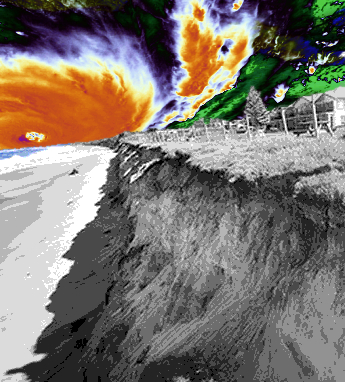Academy calls for extreme focus
 The Australian Academy of Science will this week tell a Senate committee that Australia must deal with extreme weather events much more effectively.
The Australian Academy of Science will this week tell a Senate committee that Australia must deal with extreme weather events much more effectively.
“Scientific evidence shows that as the world warms due to human-induced climate change, we experience an increase in the frequency and severity of extreme weather events,” according to a submission by the Australian Academy of Science to a committee investigating Australia’s bushfire response.
“As such [extreme weather] events become more frequent and severe, we must adapt Australia and Australians accordingly, and strengthen our mitigation efforts.
“Bushfires, along with other weather and climate challenges, pose complex and wide-ranging problems. Climate change, temperature extremes, droughts, storms, wind, and floods are intersecting and entangled. These must be addressed together.”
Academy Fellows Professor David Lindenmayer and Professor Chris Dickman will appear before the Senate Standing Committee on Finance and Public Administration inquiry on behalf of the Academy.
They will tell the committee that the monitoring of Australian landscapes must be given the highest priority to give affected species and ecosystems the best chance of recovering from this summer’s bushfires.
Professor Dickman said Australia does not have really effective monitoring in much of the forest and woodland estate.
“The consequence is that it is very difficult now to get a handle on exactly what the fires have done,” said Professor Dickman, who is based at the University of Sydney.
“My worst fear is that some species whose ranges were largely in the path of the fires and were already in poor shape to begin will actually have disappeared—there’ll be extinction at the species level.”
Professor Lindenmayer said important monitoring work initiated by the Department of Agriculture, Water and the Environment in conjunction with other organisations and researchers—but restricted by safety concerns and interrupted by the COVID-19 outbreak—must be continued and backed up by meaningful management actions.
“The Academy is resolute that the response to the bushfires must extend beyond the immediate and essential need to rebuild and recover,” said Professor Lindenmayer, who is based at the Australian National University.
“While immediate responses are important, broader issues including habitat restoration; biodiversity and species preservation; land, water and wildlife management; agricultural practices and more will need careful and measured consideration.”
The Academy’s submission also highlights the importance for the Senate—and all Australians—to have trustworthy information and answers about impacts of the 2019–20 megafires.
It says “with much misinformation in the public domain about the cause and impacts of the bushfires, we urge Australians to continue to consult reputable sources of evidence-based information such as the Australian Academy of Science, CSIRO and the Bureau of Meteorology.”
The Academy has also published the second in a series of expert briefs on bushfire recovery. The new brief covers the impacts of bushfire on Australian wildlife, and the role of immediate and long-term monitoring to inform protection and maintenance actions to preserve our unique ecosystems. The first brief focused on the condition of soil after bushfires.







 Print
Print